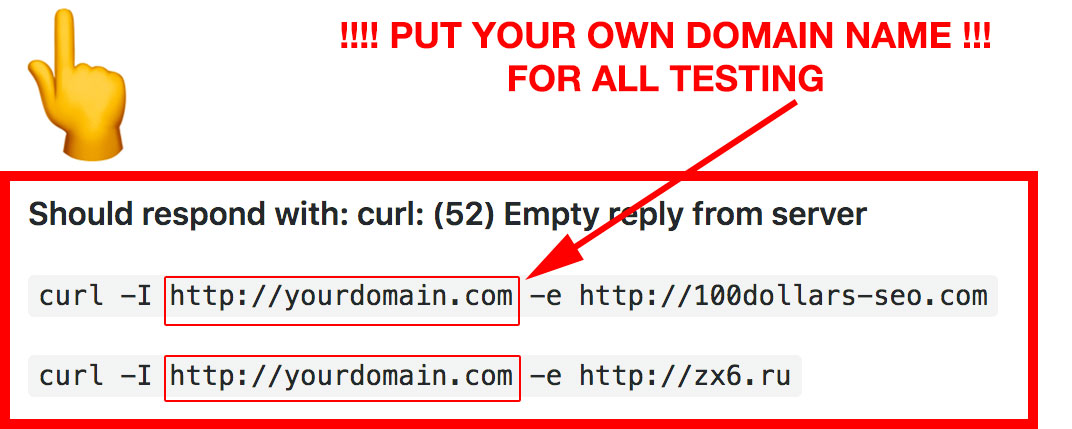| REPO | INFO |
|---|---|
Nginx Bad Bot and User-Agent Blocker, Spam Referrer Blocker, Anti DDOS, Bad IP Blocker and Wordpress Theme Detector Blocker
The Ultimate Nginx Bad Bot, User-Agent, Spam Referrer Blocker, Adware, Malware and Ransomware Blocker, Clickjacking Blocker, Click Re-Directing Blocker, SEO Companies and Bad IP Blocker with Anti DDOS System, Nginx Rate Limiting and Wordpress Theme Detector Blocking. Stop and Block all kinds of bad internet traffic even Fake Googlebots from ever reaching your web sites. PLEASE SEE: Definition of Bad Bots
Bad Referrers Blocked: 7067
Bad User-Agents (Bots) Blocked: 615
Fake Googlebots Blocked: 217
- Created by: Mitchell Krog for use on Nginx Web Server
- Copyright Mitchell Krog [email protected]
Please make sure you are subscribed to Github Notifications to be notified when the blocker is updated or when any important or mission critical (potentially breaking) changes may take place.
-
This is our new preferred method of installation which is now done through a set of shell scripts contributed to this repo and maintained by Stuart Cardall @itoffshore who is one of the Alpine Linux package maintainers.
-
The instructions below are for a quick and painfree installation process which downloads all required files for the blocker and the scripts include adding the required includes to your nginx.conf and nginx .vhost files. The setup script assumes your vhost config files are located in /etc/nginx/sites-available/ and each vhost config file ends with a file extension of .vhost
-
For manual installation instructions please see - Please see: https://github.com/mitchellkrogza/nginx-ultimate-bad-bot-blocker/blob/master/MANUAL-CONFIGURATION.md
-
setup-ngxblocker, install-ngxblocker and update-ngxblocker can all be configured with custom installation / update locations from the command line. (See Step 11 of the instructions to show you how use these scripts and non-standard Nginx locations)
-
Run any of the setup, install or update scripts with --help or -h to view options.
PLEASE NOTE: For those using Let's Encrypt SSL Certificates the preferred and 100% working method is to use the Webroot Authenticator Method. There appears to be some issues with people using the http challenge method but can confirm that webroot work flawlessly. We are uncertain at this point whether the http-01 challenge method is a certbot or nginx bug.
Download install-ngxblocker to your /usr/local/sbin/directory and make the script executable.
sudo wget https://raw.githubusercontent.com/mitchellkrogza/nginx-ultimate-bad-bot-blocker/master/install-ngxblocker -O /usr/local/sbin/install-ngxblocker
sudo chmod +x /usr/local/sbin/install-ngxblockerIf your Linux distribution does not have wget you can replace the wget command above using curl as follows:
curl -sL https://raw.githubusercontent.com/mitchellkrogza/nginx-ultimate-bad-bot-blocker/master/install-ngxblocker -o /usr/local/sbin/install-ngxblockerInstall the package.
pkg install www/nginx-ultimate-bad-bot-blockerAlternatively install via portmaster:
portmaster www/nginx-ultimate-bad-bot-blockerNow run the install-ngxblocker script in DRY-MODE which will show you what changes it will make and what files it will download for you. This is only a DRY-RUN so no changes are being made yet.
The install-ngxblocker downloads all required files including the setup and update scripts.
cd /usr/local/sbin
sudo ./install-ngxblockerThis will show you output as follows of the changes that will be made (NOTE: this is only a DRY-RUN no changes have been made)
Checking url: https://raw.githubusercontent.com/mitchellkrogza/nginx-ultimate-bad-bot-blocker/master/include_filelist.txt
** Dry Run ** | not updating files | run as 'install-ngxblocker -x' to install files.
Creating directory: /etc/nginx/bots.d
REPO = https://raw.githubusercontent.com/mitchellkrogza/nginx-ultimate-bad-bot-blocker/master
Downloading [FROM]=> [REPO]/conf.d/globalblacklist.conf [TO]=> /etc/nginx/conf.d/globalblacklist.conf
Downloading [FROM]=> [REPO]/conf.d/botblocker-nginx-settings.conf [TO]=> /etc/nginx/conf.d/botblocker-nginx-settings.conf
REPO = https://raw.githubusercontent.com/mitchellkrogza/nginx-ultimate-bad-bot-blocker/master
Downloading [FROM]=> [REPO]/bots.d/blockbots.conf [TO]=> /etc/nginx/bots.d/blockbots.conf
Downloading [FROM]=> [REPO]/bots.d/ddos.conf [TO]=> /etc/nginx/bots.d/ddos.conf
Downloading [FROM]=> [REPO]/bots.d/whitelist-ips.conf [TO]=> /etc/nginx/bots.d/whitelist-ips.conf
Downloading [FROM]=> [REPO]/bots.d/whitelist-domains.conf [TO]=> /etc/nginx/bots.d/whitelist-domains.conf
Downloading [FROM]=> [REPO]/bots.d/blacklist-user-agents.conf [TO]=> /etc/nginx/bots.d/blacklist-user-agents.conf
Downloading [FROM]=> [REPO]/bots.d/blacklist-ips.conf [TO]=> /etc/nginx/bots.d/blacklist-ips.conf
Downloading [FROM]=> [REPO]/bots.d/bad-referrer-words.conf [TO]=> /etc/nginx/bots.d/bad-referrer-words.conf
Downloading [FROM]=> [REPO]/bots.d/custom-bad-referrers.conf [TO]=> /etc/nginx/bots.d/custom-bad-referrers.conf
REPO = https://raw.githubusercontent.com/mitchellkrogza/nginx-ultimate-bad-bot-blocker/master
Downloading [FROM]=> [REPO]/setup-ngxblocker [TO]=> /usr/local/sbin/setup-ngxblocker
Downloading [FROM]=> [REPO]/update-ngxblocker [TO]=> /usr/local/sbin/update-ngxblocker
setup-ngxblocker, install-ngxblocker and update-ngxblocker can all be configured with custom installation / update locations from the command line.
Run any of the setup, install or update scripts with --help or -h to view options.
Now run the install script with the -x parameter to download all the necessary files from the repository:
cd /usr/local/sbin/
sudo ./install-ngxblocker -xThis will give you the following output:
Checking url: https://raw.githubusercontent.com/mitchellkrogza/nginx-ultimate-bad-bot-blocker/master/include_filelist.txt
Creating directory: /etc/nginx/bots.d
REPO = https://raw.githubusercontent.com/mitchellkrogza/nginx-ultimate-bad-bot-blocker/master
Downloading [FROM]=> [REPO]/conf.d/globalblacklist.conf [TO]=> /etc/nginx/conf.d/globalblacklist.conf...OK
Downloading [FROM]=> [REPO]/conf.d/botblocker-nginx-settings.conf [TO]=> /etc/nginx/conf.d/botblocker-nginx-settings.conf...OK
REPO = https://raw.githubusercontent.com/mitchellkrogza/nginx-ultimate-bad-bot-blocker/master
Downloading [FROM]=> [REPO]/bots.d/blockbots.conf [TO]=> /etc/nginx/bots.d/blockbots.conf...OK
Downloading [FROM]=> [REPO]/bots.d/ddos.conf [TO]=> /etc/nginx/bots.d/ddos.conf...OK
Downloading [FROM]=> [REPO]/bots.d/whitelist-ips.conf [TO]=> /etc/nginx/bots.d/whitelist-ips.conf...OK
Downloading [FROM]=> [REPO]/bots.d/whitelist-domains.conf [TO]=> /etc/nginx/bots.d/whitelist-domains.conf...OK
Downloading [FROM]=> [REPO]/bots.d/blacklist-user-agents.conf [TO]=> /etc/nginx/bots.d/blacklist-user-agents.conf...OK
Downloading [FROM]=> [REPO]/bots.d/blacklist-ips.conf [TO]=> /etc/nginx/bots.d/blacklist-ips.conf...OK
Downloading [FROM]=> [REPO]/bots.d/bad-referrer-words.conf [TO]=> /etc/nginx/bots.d/bad-referrer-words.conf...OK
Downloading [FROM]=> [REPO]/bots.d/custom-bad-referrers.conf [TO]=> /etc/nginx/bots.d/custom-bad-referrers.conf...OK
REPO = https://raw.githubusercontent.com/mitchellkrogza/nginx-ultimate-bad-bot-blocker/master
Downloading [FROM]=> [REPO]/setup-ngxblocker [TO]=> /usr/local/sbin/setup-ngxblocker...OK
Downloading [FROM]=> [REPO]/update-ngxblocker [TO]=> /usr/local/sbin/update-ngxblocker...OK
All the required files have now been downloaded to the correct folders on Nginx for you direct from the repository.
MAKE SURE you set your setup and update scripts to be executable by running the following two commands. This is important before continuing with Step 4 and onwards.
sudo chmod +x /usr/local/sbin/setup-ngxblocker
sudo chmod +x /usr/local/sbin/update-ngxblockersetup-ngxblocker, install-ngxblocker and update-ngxblocker can all be configured with custom installation / update locations from the command line.
Run any of the setup, install or update scripts with --help or -h to view options.
Now run the setup-ngxblocker script in DRY-MODE which will show you what changes it will make and what files it will download for you. This is only a DRY-RUN so no changes are being made yet.
cd /usr/local/sbin/
sudo ./setup-ngxblockerThis will give you output as follows (this output below assumes your nginx.conf file already has the default include of /etc/nginx/conf.d/*) All Nginx installations I know of have this default include in the nginx.conf file distributed with all versions.
Checking url: https://raw.githubusercontent.com/mitchellkrogza/nginx-ultimate-bad-bot-blocker/master/include_filelist.txt
** Dry Run ** | not updating files | run as 'setup-ngxblocker -x' to setup files.
INFO: /etc/nginx/conf.d/* detected => /etc/nginx/nginx.conf
inserting: include /etc/nginx/bots.d/blockbots.conf; => /etc/nginx/sites-available/mydomain2.com.vhost
inserting: include /etc/nginx/bots.d/ddos.conf; => /etc/nginx/sites-available/mydomain2.com.vhost
inserting: include /etc/nginx/bots.d/blockbots.conf; => /etc/nginx/sites-available/mydomain1.com.vhost
inserting: include /etc/nginx/bots.d/ddos.conf; => /etc/nginx/sites-available/mydomain1.com.vhost
Whitelisting ip: x.x.x.x => /etc/nginx/bots.d/whitelist-ips.conf
This script also whitelists your IP in the whitelist-ips.conf file for you. Further IP's or IP ranges can be added to your customizable whitelits-ips.conf file located in /etc/nginx/bots.d/whitelist-ips.conf.
setup-ngxblocker, install-ngxblocker and update-ngxblocker can all be configured with custom installation / update locations from the command line.
Run any of the setup, install or update scripts with --help or -h to view options.
Now run the setup script with the -x parameter to make all the necessary changes to your nginx.conf (if required) and also to add the required includes into all your vhost files.
This setup-ngxblocker script assumes that all your vhost files located in /etc/nginx/sites-available end in an extension .vhost. It is good practice to make all your vhost config files end with a .vhost extension but if you prefer to stick what you already have eg .conf you can simply modify run setup-ngxblocker using the -e parameter to specify the extension you use for your vhost files.
For instance if your vhost files end in .conf you will change this execute setup-ngxblocker with an additional command line parameter as follows:
sudo ./setup-ngxblocker -x -e conf
So now let's run the setup script and let it make all the changes we need to make the Bot Blocker active on all your sites.
cd /usr/local/sbin/
sudo ./setup-ngxblocker -xYou will see output as follows:
Checking url: https://raw.githubusercontent.com/mitchellkrogza/nginx-ultimate-bad-bot-blocker/master/include_filelist.txt
INFO: /etc/nginx/conf.d/* detected => /etc/nginx/nginx.conf
inserting: include /etc/nginx/bots.d/blockbots.conf; => /etc/nginx/sites-available/mydomain2.com.vhost
inserting: include /etc/nginx/bots.d/ddos.conf; => /etc/nginx/sites-available/mydomain2.com.vhost
inserting: include /etc/nginx/bots.d/blockbots.conf; => /etc/nginx/sites-available/mydomain1.com.vhost
inserting: include /etc/nginx/bots.d/ddos.conf; => /etc/nginx/sites-available/mydomain1.com.vhost
Whitelisting ip: x.x.x.x => /etc/nginx/bots.d/whitelist-ips.conf
You will note it has done the includes in all the .vhost files on my test bed server and also whitelisted your own IP address in the whitelist-ips.conf file for you. Further IP's or IP ranges can be added to your customizable whitelits-ips.conf file located in /etc/nginx/bots.d/whitelist-ips.conf.
What this setup script has done has simply added the following include statements into your .vhost files for you, it also adds /etc/nginx/conf.d/* to the includes in nginx.conf (if not already in nginx.conf), otherwise, the whole script will fail.
# Bad Bot Blocker
include /etc/nginx/bots.d/ddos.conf;
include /etc/nginx/bots.d/blockbots.conf;setup-ngxblocker, install-ngxblocker and update-ngxblocker can all be configured with custom installation / update locations from the command line.
Run any of the setup, install or update scripts with --help or -h to view options.
Now test your nginx configuration
sudo nginx -t
and you should see
nginx: the configuration file /etc/nginx/nginx.conf syntax is ok
nginx: configuration file /etc/nginx/nginx.conf test is successful
Now simply reload / restart Nginx and the Bot Blocker will immediately be active and protecting all your web sites.
sudo nginx -t && sudo nginx -s reload
or
sudo service nginx restart
That's it, the blocker is now active and protecting your sites from thousands of malicious bots and domains.
Now setup cron to automatically update the blocker for you every day so you always have the latest up to date protection.
sudo crontab -e
Add the following line at the end of your crontab file. Note adding the -e command line parameter to specify your email address where the update report is sent to. Obviously substitute [email protected] with your real email address or you will not receive the email when the script has updated.
00 22 * * * sudo /usr/local/sbin/update-ngxblocker -e [email protected]
This will update the blocker every night for you at 10 PM.
If you want it to update more frequently (as sometimes I push out 3-4 updates a day) you can set it as follows to run the cron every 8 hours, although just once a day is more than enough.
00 */8 * * * sudo /usr/local/sbin/update-ngxblocker -e [email protected]
If you don't want any email notification after an update (not advisable in case Nginx ever has an EMERG when reloading), then simply run your cron as follows.
00 */8 * * * sudo /usr/local/sbin/update-ngxblocker -n
If you would rather send e-mail via mailgun then run your cron as so:
00 22 * * * sudo /usr/local/sbin/update-ngxblocker -g [email protected] -d yourdomain.com -a mailgun api key -f [email protected]
That's it, the blocker will automatically keep itself up to date and also reload Nginx once it has downloaded the latest version of the globalblacklist.conf file.
You can now customize any of the following files below to suit your environment or requirements. These include files never get modified during an update using the auto update script above so whatever customizations you do here will never be overwritten during an update.
/etc/nginx/bots.d/whitelist-ips.conf
/etc/nginx/bots.d/whitelist-domains.conf
/etc/nginx/bots.d/blockbots.conf
/etc/nginx/bots.d/blacklist-domains.conf
/etc/nginx/bots.d/blacklist-user-agents.conf
/etc/nginx/bots.d/blacklist-ips.conf
/etc/nginx/bots.d/bad-referrer-words.conf
/etc/nginx/bots.d/custom-bad-referrers.conf
/etc/nginx/bots.d/ddos.conf
Let's say for some "obscure" reason you actually want to block GoogleBot from accessing your site. You would simply add it to the /etc/nginx/bots.d/blacklist-user-agents.conf file and it will over-ride the default whitelist for GoogleBot. the same applies to any other bots that are whitelisted by default.
All include files are commented for your convenience.
(TEST THAT IT IS WORKING)
TESTING
Run the following commands one by one from a terminal on another linux machine against your own domain name.
❗ substitute https:// yourdomain.com ❗ in the examples below with your own REAL domain name ❗
curl -A "Mozilla/5.0 (Linux; Android 6.0.1; Nexus 5X Build/MMB29P) AppleWebKit/537.36 (KHTML, like Gecko) Chrome/41.0.2272.96 Mobile Safari/537.36 (compatible; Googlebot/2.1; +https://www.google.com/bot.html)" -I https://yourdomain.com
curl -A "Mozilla/5.0 (compatible; bingbot/2.0; +https://www.bing.com/bingbot.htm)" -I https://yourdomain.com
Should respond with 200 OK
curl -A "Xenu Link Sleuth/1.3.8" -I https://yourdomain.com
curl -A "Mozilla/5.0 (compatible; AhrefsBot/5.2; +https://ahrefs.com/robot/)" -I https://yourdomain.com
Should respond with either of the following error messages:
- curl: (52) Empty reply from server
- curl: (56) TCP connection reset by peer
- curl: (92) HTTP/2 stream 0 was not closed cleanly: PROTOCOL_ERROR (err 1)
curl -I https://yourdomain.com -e https://100dollars-seo.com
curl -I https://yourdomain.com -e https://zx6.ru
Should respond with either of the following error messages:
- curl: (52) Empty reply from server
- curl: (56) TCP connection reset by peer
- curl: (92) HTTP/2 stream 0 was not closed cleanly: PROTOCOL_ERROR (err 1)
The Nginx Ultimate Bot Blocker is now WORKING and PROTECTING your web sites !!!
❗ substitute https:// yourdomain.com ❗ in the examples below with your own REAL domain name ❗
If you are a Cloudflare user who is using the Cloudflare CDN / Caching System you should always disable the Cloudflare CDN (set gray Cloud)
While testing you will get the correct response codes results as below:
- curl: (52) Empty reply from server
- curl: (56) TCP connection reset by peer
- curl: (92) HTTP/2 stream 0 was not closed cleanly: PROTOCOL_ERROR (err 1)
This is by design. The CDN is doing its work, meaning, the first response from your server said to the bot, "go away" by issuing it 444 or 443 responses.
Cloudflare cache's that response and hence the second time you test you will get served a 520 Origin Error origin error message.
While testing the blocker, disable the CDN / cacheing system and once you are happy with your tests, re-enable the CDN/Cache on your live environment as you do want the bots to get that response from Cloudflare.
Most other CDN systems will probably show the same behavior so always disable a CDN during testing to rule out anything that will interfere with your testing. Always make sure to re-enable the CDN when done testing !!
Once you Enable Cloudflare CDN, test again.
While testing, you get
- curl: 520 Origin Error
This means the CDN is working.
INSTALLING THE BLOCKER TO NON-STANDARD NGINX FOLDER LOCATIONS
Some people build Nginx themselves and do not end up having the standard nginx folder locations at /etc/nginx
For users like this you can run the install-ngxblocker, setup-ngxblocker and update-ngxblocker specifying your folder location in the command lines as follows.
sudo ./install-ngxblocker -x -c /usr/local/nginx/conf.d -b /usr/local/nginx/bots.d
sudo ./setup-ngxblocker -x -c /usr/local/nginx/conf.d -b /usr/local/nginx/bots.d
sudo ./update-ngxblocker -c /usr/local/nginx/conf.d -b /usr/local/nginx/bots.d -e [email protected]
This will automatically put the files into the locations you specify, it will do the includes into your vhosts using your custom locations and when update-ngxblocker pulls a new update it will also now automatically re-write the "Include" sections inside the globalblacklist.conf file your own custom locations. Thanks again to Stuart Cardall @itoffshore for his contributions of these excellent scripts.
- Bad Referrers
- Bad User-Agent Strings
- Spam Referrers
- Spam Bots and Bad Bots
- Nuisance or Unwanted Bots
- Sites Linked to Lucrative Malware, Adware and Ransomware Clickjacking Campaigns
- Vulnerability scanners
- Gambling and Porn Web Sites
- E-mail harvesters
- Content scrapers
- Link Ranking Bots
- Aggressive bots that scrape content
- Image Hotlinking Sites and Image Thieves
- Bots or Servers linked to viruses or malware
- Government surveillance bots
- Botnet Attack Networks (Mirai)
- Known Wordpress Theme Detectors (Updated Regularly)
- SEO companies that your competitors use to try improve their SEO
- Link Research and Backlink Testing Tools
- Stopping Google Analytics Ghost Spam
- Browser Adware and Malware (Yontoo etc)
(Over 4000 bad referers, spam referrers, user-agents, bad bots, bad IP's, porn, gambling and clickjacking sites, lucrative seo companies, wordpress theme detectors and counting)
- Includes the creation of a google-exclude.txt file for creating filters / segments in Google Analytics (see instructions lower down)
- Includes the creation of a google-disavow.txt file for use in Google Webmaster Tools (see instructions lower down)
- See sample Nginx SSL Vhost config at: https://github.com/mitchellkrogza/nginx-ultimate-bad-bot-blocker/blob/master/NGINX-SSL-Site-Config-Example.md
Thousand of hours of programming and testing have gone into this project, show some love
Welcome to the Ultimate Nginx Bad Bot, User-Agent, Spam Referrer Blocker, Adware, Malware and Ransomware Blocker, Click-Jacking Blocker, Click-Redirect Blocker and Bad IP Blocker with Anti DDOS System, Nginx Rate Limiting and Wordpress Theme Detector Blocking.
Bots attempt to make themselves look like other software or web sites by disguising their user agent. Their user agent names may look harmless, perfectly legitimate even.
For example, "^Java" but according to Project Honeypot, it's actually one of the most dangerous BUT a lot of legitimate bots out there have "Java" in their user agent string so the approach taken by many to block "Java" is not only ignorant but also blocking out very legitimate crawlers including some of Google's and Bing's and makes it very clear to me that those people writing bot blocking scripts seldom ever test them.
Spam Referrers and Spam Domain Names use very clever techniques to hop off your sites running very lucrative click-jacking and click-redirecting campaigns which serve ads to unsuspecting people browsing the web or even planting malware, adware or ransomware into their browsers which then become part of their lucrative network of bots.
This Bot Blocker includes hundreds of domain names and IP addresses that most people will not even see in their Nginx logs. This comes as a result of all my sites running of SSL and using Content-Security-Policy (CSP) which blocks things before they even get to Nginx and I have picked up and continue to pick up some of the worst domains and bots out there.
A massive amount of Porn, Gambling and Fake News web sites are also blocked in this blocker script which also grows at a rapid pace.
Unfortunately most bot blocker scripts out there are simply copy and pasted from other people's scripts and made to look like their own work. This one was inspired by the one created by https://github.com/mariusv and I contributed to that project but went off into a totally new layout, cleaned it up big time and started from scratch. It is now a completely independent project. It's clean, it works and has been thoroughly tested.
This nginx bad bot bot blocker list is designed to be a global Nginx include file and uses the Nginx map $http_user_agent, map $http_referer and geo $validate_client directives.
This way the .conf file is loaded once into memory by Nginx and is available to all web sites that you operate. You simply need to use an Include statement in an Nginx vhost conf file.
The beauty of this is that it is one central file used by all your web sites. This means there is only place to make amendments ie. adding new bots that you discover in your log files. Any changes are applied immediately to all sites after a simple "sudo service nginx reload". But of course always do a sudo nginx -t to test any config changes before you reload.
The file is tiny in size. At the time of this writing and the first public commit of this the file size including all the commenting "which nginx ignores" currently at a mere 185 kb in size and already containing over 5000 bad domains, bad bots and bad IP addresses. It is so lightweight that Nginx does not even know it's there. It already contains thousands of entries - total updated at the top of this README.
Unlike many other bad bot blockers out there for Nginx and Apache where people simply copy and paste lists from others, this list has been built from the ground up and tested thoroughly and I mean thoroughly for now over 10 months. It comes from actual server logs that are monitored daily and there are at least 3-10 new additions to this file almost daily.
It has also been throughly tested for false positives using months of constant and regular testing and monitoring of log files.
All web sites listed in the bad referers are checked one by one before they are even added. Simply copying anything that look suspicious in your log file and adding it to a blocker like this without actually seeing what it is first .... well it's foolish to say the least.
Nginx has a lovely error called 444 which just literally drops the connection. All these rules issue a 444 response so if a rule matches, the requesting IP simply get's no response and it would appear that your server does not exist to them or appears to be offline.
A test with curl using one of the test command line's documented in the /conf.d/globalblacklist.conf file will give a simple "curl: (52) Empty reply from server" and that's the reply the bad referrers and bots get.
For bot's or spiders that you still want to allow but want to limit their visitation rate, you can use the built in rate limiting functions I have included. The file is extensively commented throughout so you should figure it out otherwise simply message me if you are having problems.
or to contribute your own bad referers, bots or to make corrections to any incorrectly blocked bots or domains please fork a copy of this repository and send pull requests on the individual files located here and then send a pull request (PR).
All Additions, Removals and Corrections will all be checked for accuracy before being merged into main blocker.
regarding incorrect listings or any other problems on the issues system and they will be investigated and removed if necessary. I responde very quickly to user problems and have helped countless users for days on end to get their bot blocker working. You could say I am mad (disputable) but I love helping people and do not ignore issues or people with problems getting this to work.
- Extensive Lists of Bad and Known Bad Bots and Scrapers (updated almost daily)
- Blocking of Spam Referrer Domains and Web Sites
- Blocking of SEO data collection companies like Semalt.com, Builtwith.com, WooRank.com and many others (updated regularly)
- Blocking of clickjacking Sites linked to Adware, Malware and Ransomware
- Blocking of Porn and Gambling Web Sites who use Lucrative Ways to Earn Money through Serving Ads by hopping off your domain names and web sites.
- Blocking of Bad Domains and IP's that you cannot even see in your Nginx Logs. Thanks to the Content Security Policy (CSP) on all my SSL sites I can see things trying to pull resources off my sites before they even get to Nginx and get blocked by the CSP.
- Anti DDOS Filter and Rate Limiting of Agressive Bots
- Alphabetically ordered for easier maintenance (Pull Requests Welcomed)
- Commented sections of certain important bots to be sure of before blocking
- Includes the IP range of Cyveillance who are known to ignore robots.txt rules and snoop around all over the Internet.
- Whitelisting of Google, Bing and Cloudflare IP Ranges
- Whitelisting of your own IP Ranges that you want to avoid blocking by mistake.
- Ability to add other IP ranges and IP blocks that you want to block out.
- If its out there and it's bad it's already in here and BLOCKED !!
A lot of lists out there put funny domains into their hosts file. Your hosts file and DNS will not understand this. This list uses converted domains which are in the correct DNS format to be understood by any operating system. Avoid using lists that do not put the correctly formatted domain structure into their lists.
For instance The domain:
lifehacĸer.com (note the K)
actually translates to:
xn--lifehacer-1rb.com
You can do an nslookup on any operating system and it will resolve correctly.
nslookup xn--lifehacer-1rb.com
origin = dns1.yandex.net
mail addr = iskalko.yandex.ru
serial = 2016120703
refresh = 14400
retry = 900
expire = 1209600
minimum = 14400
xn--lifehacer-1rb.com mail exchanger = 10 mx.yandex.net.
Name: xn--lifehacer-1rb.com
Address: 78.110.60.230
xn--lifehacer-1rb.com nameserver = dns2.yandex.net.
xn--lifehacer-1rb.com text = "v=spf1 redirect=_spf.yandex.net"
xn--lifehacer-1rb.com nameserver = dns1.yandex.net.
- Look at: https://www.charset.org/punycode for more info on this.
MAKE SURE to monitor your web site logs after implementing this. I suggest you first load this into one site and monitor it for any possible false positives before putting this into production on all your web sites.
Do not sit like an ostrich with your head in the sand, being a responsible server operator and web site owner means you must monitor your logs frequently. A reason many of you ended up here in the first place because you saw nasty looking stuff in your Nginx log files.
Also monitor your logs daily for new bad referers and user-agent strings that you want to block. Your best source of adding to this list is your own server logs, not mine.
Feel free to contribute bad referers from your own logs to this project by sending a Pull Request (PR). You can however rely on this list to keep out 99% of the baddies out there.
With great thanks and appreciation to
https://blog.nexcess.net/2011/01/21/one-liners-for-apache-log-files/
To monitor your top referer's for a web site's log file's on a daily basis use the following simple cron jobs which will email you a list of top referer's / user agents every morning from a particular web site's log files. This is an example for just one cron job for one site. Set up multiple one's for each one you want to monitor. Here is a cron that runs at 8am every morning and emails me the stripped down log of referers. When I say stripped down, the domain of the site and other referers like Google and Bing are stripped from the results. Of course you must change the log file name, domain name and your email address in the examples below. The second cron for collecting User agents does not do any stripping out of any referers but you can add that functionality if you like copying the awk statement !~ from the first example.
00 08 * * * tail -10000 /var/log/nginx/mydomain-access.log | awk '$11 !~ /google|bing|yahoo|yandex|mywebsite.com/' | awk '{print $11}' | tr -d '"' | sort | uniq -c | sort -rn | head -1000 | mail -s "Top 1000 Referers for Mydomain.com" [email protected]
This emails you a daily list of referrers using an awk command to exclude domains like google, bing and your own domain name.
00 08 * * * tail -50000 /var/log/nginx/mydomain-access.log | awk '{print $12}' | tr -d '"' | sort | uniq -c | sort -rn | head -1000 | mail -s "Top 1000 Agents for Mydomain.com" [email protected]
This emails you a list of top User-Agents who visited your site in the last 24 hours, helpful for spotting any rogue or suspicious looking User-Agents strings.
I have added a custom Fail2Ban filter and action that I have written which monitors your Nginx logs for bots that generate a large number of 444 errors. This custom jail for Fail2Ban will scan logs over a 1 week period and ban the offender for 24 hours. It helps a great deal in keeping out some repeat offenders and preventing them from filling up your log files with 444 errors. See the Fail2Ban folder for instructions on configuring this great add on for the Nginx Bad Bot Blocker.
Simply using the Nginx blocker does not stop Google Analytics ghost referral spam because they are hitting Analytics directly and not always necessarily touching your website.
You should use regex filters in Analytics to prevent ghost referral spam.
For this there are several google-exclude-0*.txt files which have been created for you and they are updated at the same time when the Nginx Blocker is updated. As the list grows there will be more exclude files created.
Follow the step by step visual instructions below to add these google-exclude files as segments to your web site.
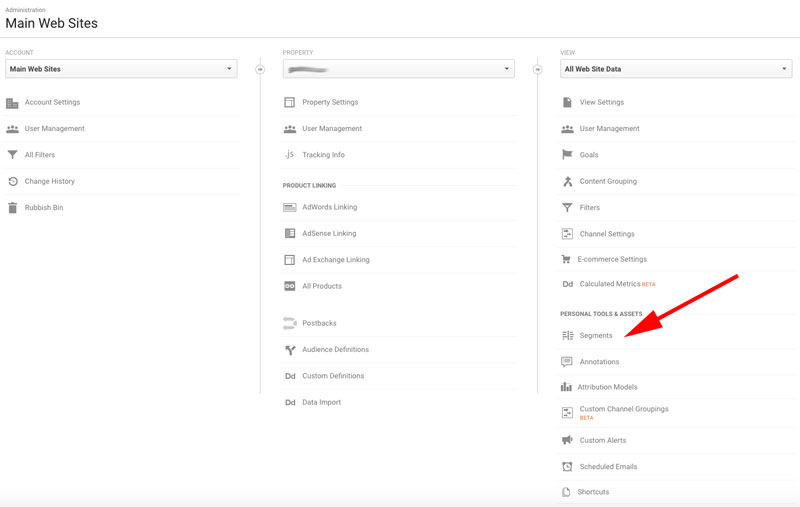 |
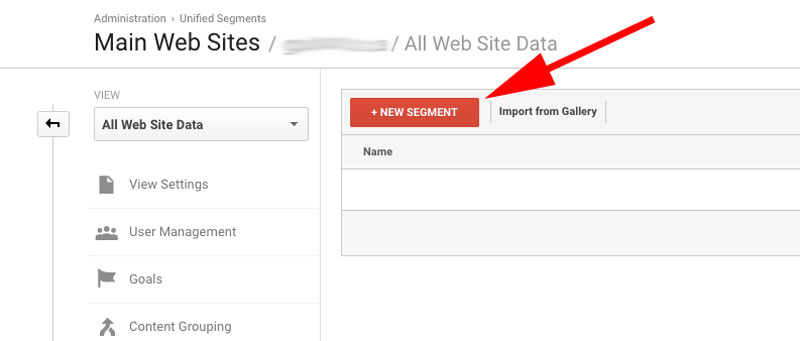 |
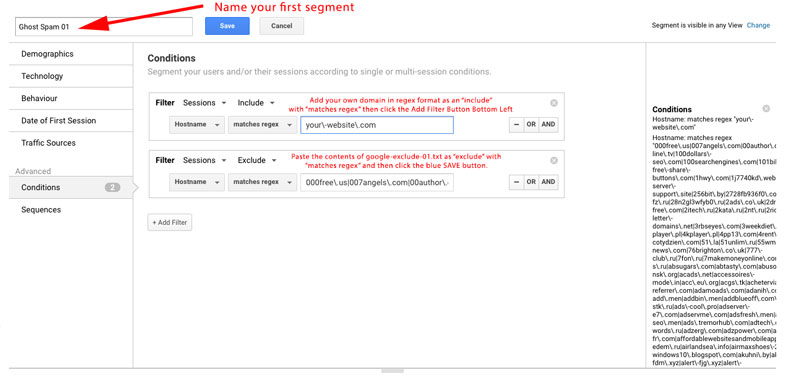 |
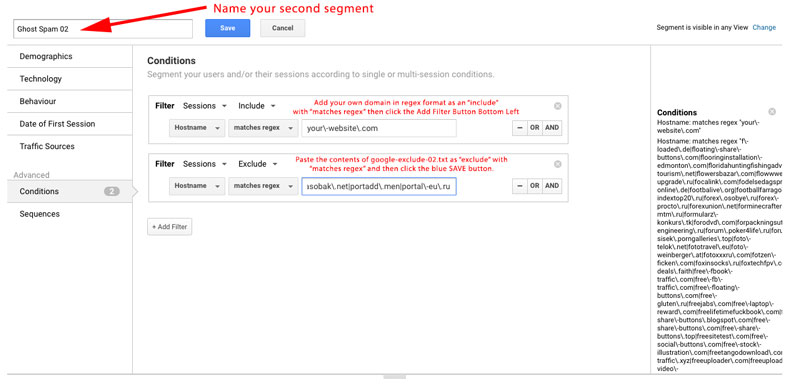 |
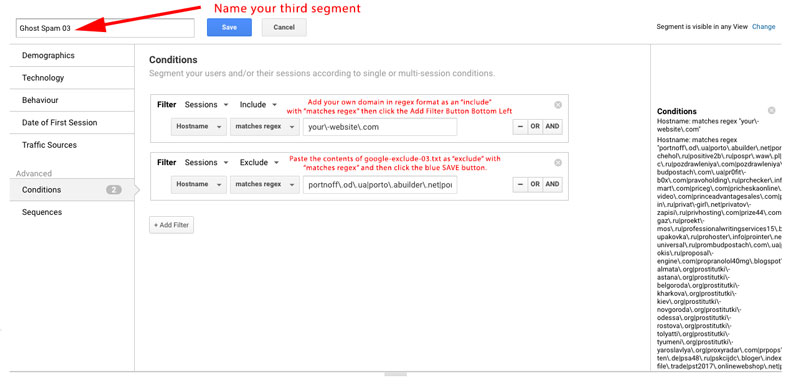 |
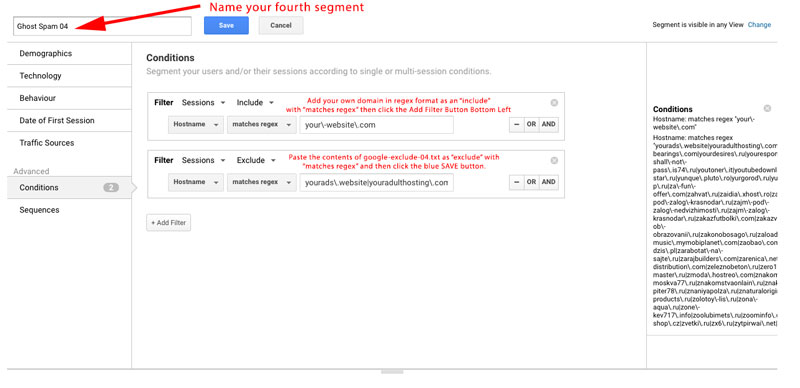 |
 |
(How to use the google-disavow.txt file)
I have added the creation of a Google Disavow text file called google-disavow.txt. This file can be used in Google's Webmaster Tools to block all these domains out as spammy or bad links. Use with caution.
Lots of people are at the peril of their hosting company and do not have root access to the server running behind their web site. If this is your situation check out the automatically generated robots.txt file which will help you to some degree to keep a lot of Bad Bots and User-Agents out of your sites.
Lots of people are at the peril of their hosting company and do not have root access to the server running behind their web site.
If this is your situation check out the automatically generated .htaccess versions of the Spam Referrer Blocker which can be found in this repository this .htaccess method (FOR APACHE SITES ONLY) will help you to keep all the Spam Referrers in this blocker out of your site.
This is merely mentioned here as a lot of people using CPanel systems think they are sitting behind an Nginx server but in reality are actually running on an Apache Server sitting behind an Nginx Proxy Server. .htaccess does not work on Nginx sites.
Not Using Nginx Web Server? See the
Thousand of hours of programming and testing have gone into this project, show some love
to help you clean up and secure your web site.
- https://github.com/mitchellkrogza/apache-ultimate-bad-bot-blocker
- https://github.com/mitchellkrogza/Badd-Boyz-Hosts
- https://github.com/mitchellkrogza/Ultimate.Hosts.Blacklist
- https://github.com/mitchellkrogza/Stop.Google.Analytics.Ghost.Spam.HOWTO
- https://github.com/mitchellkrogza/The-Big-List-of-Hacked-Malware-Web-Sites
- https://github.com/mitchellkrogza/fail2ban-useful-scripts
- https://github.com/mitchellkrogza/linux-server-administration-scripts
- https://github.com/mitchellkrogza/Travis-CI-Nginx-for-Testing-Nginx-Configuration
- https://github.com/mitchellkrogza/Travis-CI-for-Apache-For-Testing-Apache-and-PHP-Configurations
- https://github.com/mitchellkrogza/Fail2Ban-Blacklist-JAIL-for-Repeat-Offenders-with-Perma-Extended-Banning
- https://github.com/funilrys/PyFunceble
- https://github.com/funilrys/dead-hosts
- https://github.com/mitchellkrogza/The-Big-List-of-Hacked-Malware-Web-Sites
- https://github.com/mitchellkrogza/Suspicious.Snooping.Sniffing.Hacking.IP.Addresses
- https://github.com/mitchellkrogza/Fail2Ban.WebExploits
This repository contains a list of all web sites I come across that are hacked with malware. Most site owners are unaware their sites have been hacked and are being used to plant malware.
Check it out at: https://github.com/mitchellkrogza/The-Big-List-of-Hacked-Malware-Web-Sites
Come drop by and visit me at mitchellkrog.com or Facebook or Follow Me on Twitter
Many Thanks to those contributing to this project.
Many parts of the generator scripts and code running behind this project have been adapted from snippets from hundreds of sources. In fact it is so hard to mention everyone but here are a few key people whose little snippets of code have helped me introduce new features all the time. Show them some love and check out some of their projects too.
- Konstantin Goretzki @konstantingoretzki https://github.com/konstantingoretzki (Improved Regex on Fail2Ban Filter)
- Stuart Cardall - https://github.com/itoffshore (Install, Update and Setup Scripts & Alpine Linux Package Maintainer)
- Mike van Eckendonk - https://github.com/Eckybrazzz
- Nissar Chababy @funilrys - https://github.com/funilrys/PyFunceble (Excellent script for checking ACTIVE, INACTIVE and EXPIRED Domain Names)
- Marius Voila https://github.com/mariusv
- Cătălin Mariș https://github.com/alrra
- deformhead https://github.com/deformhead
- bluedragonz https://github.com/bluedragonz
- Alexander https://github.com/shoonois
- Steven Black https://github.com/StevenBlack
- Fail2Ban - https://github.com/fail2ban
- Stevie-Ray Hartog https://github.com/Stevie-Ray
- Sir Athos from StackOverFlow - https://stackoverflow.com/users/2245910/sir-athos (help with Travis Build Tagging and Committing)
- StackOverflow - https://stackoverflow.com/ (bash scripts from hundreds of questions and answers)
- SuperUser - https://superuser.com/ (snippets from various questions and answers)
If you believe your name should be here, drop me a line.
Thousand of hours of programming and testing have gone into this project, show some love
Copyright (c) 2017 Mitchell Krog - [email protected]
Permission is hereby granted, free of charge, to any person obtaining a copy of this software and associated documentation files (the "Software"), to deal in the Software without restriction, including without limitation the rights to use, copy, modify, merge, publish, distribute, sublicense, and/or sell copies of the Software, and to permit persons to whom the Software is furnished to do so, subject to the following conditions:
The above copyright notice and this permission notice shall be included in all copies or substantial portions of the Software.
THE SOFTWARE IS PROVIDED "AS IS", WITHOUT WARRANTY OF ANY KIND, EXPRESS OR IMPLIED, INCLUDING BUT NOT LIMITED TO THE WARRANTIES OF MERCHANTABILITY, FITNESS FOR A PARTICULAR PURPOSE AND NONINFRINGEMENT. IN NO EVENT SHALL THE AUTHORS OR COPYRIGHT HOLDERS BE LIABLE FOR ANY CLAIM, DAMAGES OR OTHER LIABILITY, WHETHER IN AN ACTION OF CONTRACT, TORT OR OTHERWISE, ARISING FROM, OUT OF OR IN CONNECTION WITH THE SOFTWARE OR THE USE OR OTHER DEALINGS IN THE SOFTWARE.












